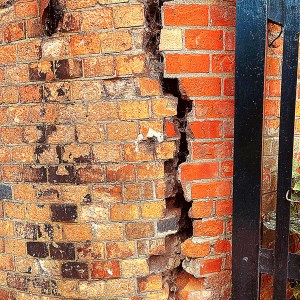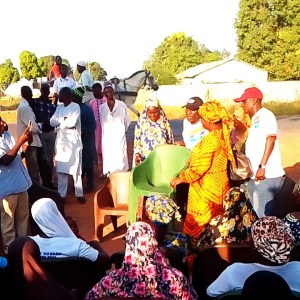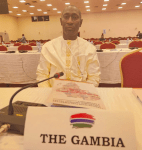Welcome. This website comprises mostly Hilary's sociological papers and articles about patriarchy, (gendered) harmful practices (e.g. female genital mutilation / FGM) and thoughts on science, health, environmental issues, sociological analysis, social policy and good practice.
 You can read this website in the language of your choice via Google Translate.
You can read this website in the language of your choice via Google Translate.
.
Hilary is a sociologist and Adjunct Professor at Northwestern University, Chicago (living in London). Much of her work now focuses on the health and safety of children and vulnerable adults, gendered violence, and, particularly, female genital mutilation.
Hilary Burrage is a consultant sociologist and journalist who has extensively researched and written about female genital mutilation (FGM) as a long-time campaigner for its eradication. She is considered an expert on the subject and has authored several highly-regarded books [etc] that address the global practice of FGM and the efforts to end it.
Female Genital Mutilation Surgical Reconstruction: The Italian Perspective…. So Why Is Britain Far Behind Italy And France?
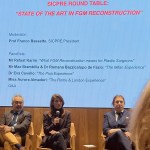 It was a privilege and pleasure to be invited to the Italian Embassy yesterday, 6 February 2026, for an event to mark the Global Day Of Zero Tolerance Against Female Genital Mutilation (FGM).
It was a privilege and pleasure to be invited to the Italian Embassy yesterday, 6 February 2026, for an event to mark the Global Day Of Zero Tolerance Against Female Genital Mutilation (FGM).
Distinguished Italian surgeons, both women and men, spoke about their work across Italy and in the UK. They told us how they use their training as plastic surgeons to repair and reconstruct genital damage inflicted on their patients by FGM. But why is Britain so far behind in this essential work?
This event, entitled ‘Investing in Care and Reconstruction‘ was promoted by the Embassy of Italy, London, in conjunction with the Italian Medical Society of Great Britain and SICPRE (Società Italiana di Chirurgia Plastica Ricostruttiva ed Estetica).
The post here explores some of the history and rationales which have informed clitoral reconstruction and similar surgeries in the UK, comparing that background with the story in Italy, France and various other countries.
You can read this website in the language of your choice via Google Translate.
Female Genital Mutilation: What We Still Don’t Know … Socio-economics (Water, Land, Knowledge): The Global Backlash
 Few would deny that we currently see a global backlash against women’s rights, status and autonomy. This has impeded work to support vulnerable women and to eradicate harms such as Female Genital Mutilation (FGM).
Few would deny that we currently see a global backlash against women’s rights, status and autonomy. This has impeded work to support vulnerable women and to eradicate harms such as Female Genital Mutilation (FGM).
Addressing this issue, the final 2025 Female Genital Mutilation seminar at Lady Margaret Hall, University of Oxford, was an International Colloquium on Advocacy and Research on Friday 5 December with the theme The Global Backlash against Women’s Rights: Ending Violence against Women means Halting FGM.
My presentation at the event concerned a socio-economic perspective only infrequently employed directly in efforts to #EndFGM – taking a look at what we still don’t know about the ways FGM continues or may be abated longer term via factors such as women’s access to water, land and literacy / knowledge.
Is there a danger over the coming years that activists’ and others’ current hugely successful interventions to end FGM will fade from collective memory, to be replaced by the forces of reaction (and all that means for tolerance of violence against women)?
Will women and girls become vulnerable again? This is where others in society – everyone from politicians to public health leaders to media commentators – must step in to support, immediately.
At a time when the global zeitgeist is turning against humanitarian interventions these are issues which surely we need to consider?
The observations below are my attempt thus far to bring such concerns to the #EndFGM agenda.
You can read this website in the language of your choice via Google Translate.
IHPE Position Statement: Female Genital Mutilation (FGM)
 The Institute of Health Promotion and Education (IHPE), of which I am a Trustee, has just published a new Position Statement on Female Genital Mutilation.
The Institute of Health Promotion and Education (IHPE), of which I am a Trustee, has just published a new Position Statement on Female Genital Mutilation.
As lead author of that Statement on FGM, I was keen to ensure that it encompasses emerging thinking on this difficult subject, and that it also acknowledges the criticality of a Public Health perspective in addressing the complex and often variable issues.
Below is a link to the full, formal Position Statement, together with references and further links to important information about FGM and various ideas and indicators concerning how its eradication is now being approached.
You can read this website in the language of your choice via Google Translate.
What We Know About Female Genital Mutilation – A Summary (2025) Of The Many And Complex Aspects
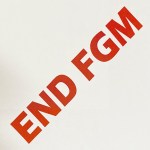 Ten years ago this Autumn saw the publication of my Routledge textbook, Eradicating Female Genital Mutilation. Detailed knowledge and understandings of female genital mutilation have developed in some respects since then, but tragically the number of women and girls who have experienced this appalling cruelty has shifted only slowly, and the stark realities of FGM have not much changed. This briefing is an effort to summarise current facts and debates about FGM as we approach 2030, the date by which the United Nations insists that FGM be abolished.
Ten years ago this Autumn saw the publication of my Routledge textbook, Eradicating Female Genital Mutilation. Detailed knowledge and understandings of female genital mutilation have developed in some respects since then, but tragically the number of women and girls who have experienced this appalling cruelty has shifted only slowly, and the stark realities of FGM have not much changed. This briefing is an effort to summarise current facts and debates about FGM as we approach 2030, the date by which the United Nations insists that FGM be abolished.
I hope the condensed resume (which follows below) of what we currently know about issues around FGM will be helpful to those – perhaps teachers, journalists, students in the health, legal and wider social care professions, policy makers and concerned community members, maybe even some activists? – seeking a quick overview. I have also provided numerous weblinks for anyone wanting to explore particular aspects further, but summaries of this sort necessarily still miss many aspects of the matters to hand. I welcome any further suggestions and thoughts you as readers might like to add in the Comments (Reply) box at the end of this post. Thank you.
You can read this website in the language of your choice via Google Translate.
 The story of how I became probably the first researcher in Britain to investigate ‘women scientists’ is perhaps a telling example of the confusions back then of higher education for first-generation female undergraduates like me. My initial degree studies in the late 1960s were in natural science, but I soon realised that the (then new and daring!) study of Sociology might be rather engaging. So I defected to the social sciences… and in 1971 got myself, as the only female student, onto a very-new-at-the-time Master’s course on the Sociology of Science and Technology.
The story of how I became probably the first researcher in Britain to investigate ‘women scientists’ is perhaps a telling example of the confusions back then of higher education for first-generation female undergraduates like me. My initial degree studies in the late 1960s were in natural science, but I soon realised that the (then new and daring!) study of Sociology might be rather engaging. So I defected to the social sciences… and in 1971 got myself, as the only female student, onto a very-new-at-the-time Master’s course on the Sociology of Science and Technology.
So maybe now, half a century later, is a good time to share the overall results of my enquiries back in the early 1970s?
You can read this website in the language of your choice via Google Translate.
 The International Day of Zero Tolerance for Female Genital Mutilation (FGM) (UN. nd) was introduced on February 6, 2003, by Stella Obasanjo, the First Lady of Nigeria and spokesperson for the Campaign Against Female Genital Mutilation, who made the official declaration on “Zero Tolerance to FGM” in Africa during a conference organized by the Inter-African Committee on Traditional Practices Affecting the Health of Women and Children (IAC. 2025).
The International Day of Zero Tolerance for Female Genital Mutilation (FGM) (UN. nd) was introduced on February 6, 2003, by Stella Obasanjo, the First Lady of Nigeria and spokesperson for the Campaign Against Female Genital Mutilation, who made the official declaration on “Zero Tolerance to FGM” in Africa during a conference organized by the Inter-African Committee on Traditional Practices Affecting the Health of Women and Children (IAC. 2025).
This post is the fully referenced version of a paper I prepared which I was pleased then to have published as an Editorial on 4 February 2025 for the International Journal of Health Promotion and Education: International day of zero tolerance for female genital mutilation.
You can read this website in the language of your choice via Google Translate.
Clean Air + Green Planet = Good Health For All
 This very straightforward slogan is in fact the title of a WHO publication about a European conference held on 5 July 2023. The passage it headlines tells us that ‘Each year, across the 53-country WHO European Region, an estimated 1.4 million deaths are linked to environmental risk factors, such as pollution and climate change.’
This very straightforward slogan is in fact the title of a WHO publication about a European conference held on 5 July 2023. The passage it headlines tells us that ‘Each year, across the 53-country WHO European Region, an estimated 1.4 million deaths are linked to environmental risk factors, such as pollution and climate change.’
Below is a short piece I wrote about this issue for the (free subscription) January 2025 Newsletter of the Institute of Health Promotion and Education, of which I am a Trustee….
You can read this website in the language of your choice via Google Translate.
Seasonal Flu, RSV And Covid: UK Vaccination Rates Plummet, Including For Health Workers, Whilst Emergencies Rise
 Reports show that flu, respiratory syncytial virus (RSV) and viruses such as norovirus – as well as continuing cases of Covid – are impacting seriously on hospital admissions as of the last week of 2024 and the start of 2025. Figures from NHS England have revealed there was an average of 4,469 flu patients in hospital in England every day in the last week of December 2024. I wrote a short piece about this issue for the (free subscription) January 2025 Newsletter of the Institute of Health Promotion and Education, of which I am a Trustee….
Reports show that flu, respiratory syncytial virus (RSV) and viruses such as norovirus – as well as continuing cases of Covid – are impacting seriously on hospital admissions as of the last week of 2024 and the start of 2025. Figures from NHS England have revealed there was an average of 4,469 flu patients in hospital in England every day in the last week of December 2024. I wrote a short piece about this issue for the (free subscription) January 2025 Newsletter of the Institute of Health Promotion and Education, of which I am a Trustee….
My IHPE blog is below, followed by some thoughts on the striking drop in vaccination rates also of clinicians and other health care workers.
You can read this website in the language of your choice via Google Translate.
Female Genital Mutilation (FGM) in Context: A Guest Editorial
.
 I am pleased that this brief overview of the complexities of ending FGM was today published as a Guest Editorial in the Journal EC Gynaecology.
I am pleased that this brief overview of the complexities of ending FGM was today published as a Guest Editorial in the Journal EC Gynaecology.
Many talented, brave and committed people continue to work for the eradication of FGM, but we are not by any means there as yet.
Below I explore a few possible aspects of this continuing challenge.
You can read this website in the language of your choice via Google Translate.
FGM And Dignity – For Want Of A Chair? My Talk To The World Bank About FGM In The Gambia
 I was grateful yesterday for the opportunity to give a Zoom talk, with legal colleagues, to people at the World Bank concerned about #EndFGM. The focus of my own contribution was economics and adult status – I firmly believe women will be less willing to undergo female genital mutilation if and when they have full adult legal and economic status in their own right; but at present that is rarely the case. Women remain in so many ways dependent on the men in their communities, and FGM continues to be essential to securing that dependency.
I was grateful yesterday for the opportunity to give a Zoom talk, with legal colleagues, to people at the World Bank concerned about #EndFGM. The focus of my own contribution was economics and adult status – I firmly believe women will be less willing to undergo female genital mutilation if and when they have full adult legal and economic status in their own right; but at present that is rarely the case. Women remain in so many ways dependent on the men in their communities, and FGM continues to be essential to securing that dependency.
There are often (if not always?), I suggest, three critical elements required for the eradication of FGM:
*Committed, supported advocates ‘on the ground’ who can talk with direct experience of FGM, as survivors, family members, or (‘even’) past ‘cutters’ who have now realised what FGM really entails; and add to that, where possible, the advice of teachers and clinicians working in the community.
*A legal system which is clear that FGM (and other violence against women and girls) is illegal and will actually be punished.
*And, very importantly, a socio- economic system which enables women to conduct their lives as adults, autonomously, with education, their own (adequate) income and freedom to make their own choices.
As a particular element in one constituency of The Gambia of this third ‘socio-economic’ requirement, plastic chairs became a focus of attention. I explain why below.
Update, 23 November 2024: This is the appeal which we worked on: Chairs for hardworking Gambian women farmers’ meetings. We raised £600! The 50 chairs have now arrived in Lower Fulladu West. So much thanks to all who have donated and / or helped to make this happen.
You can read this website in the language of your choice via Google Translate.
Continue reading…..
Ending FGM In The Gambia Needs Real Action As Well As Words
.
You can TRANSLATE this website to the language of your choice via the Google weblink.
.
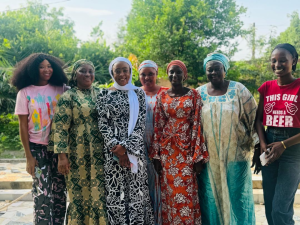
The Gambia Assembly (parliament) recently voted to retain legislation against female genital mutilation, but this decision is still not without controversy. There are people who claim, erroneously, that it is required by Islam so they continue to want to permit this cruel practice.
Amongst those who have resolutely supported the ban on FGM is the Hon Gibbi Mballow, a member of the National Assembly. This courageous decision has however proved costly to him personally and his family.
It is obvious that many people in The Gambia, including numbers of Hon Gibbi’s own constituents, will require more than fine words before they are convinced that abandoning traditional ways is acceptable. They will probably be more persuaded by real practical support towards safer and more comfortable lives, than by legal, or maybe even ‘religious’, arguments; so that tangible support is what Gibbi Mballow now seeks to secure.
Protecting Women & Girls in the UK from Female Genital Mutilation – Webinar, 29 August 2024
.
You can TRANSLATE this website to the language of your choice via the Google weblink.
.
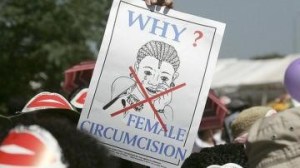 The Public Policy Exchange is holding a webinar on Thursday 29 August, on the subject of Protecting Women & Girls in the UK from Female Genital Mutilation: Prospect for Safeguarding the Vulnerable, Supporting Survivors & Increasing Prosecutions Under a New Labour Government. The event is from 09.30 to 13.00 BST.
The Public Policy Exchange is holding a webinar on Thursday 29 August, on the subject of Protecting Women & Girls in the UK from Female Genital Mutilation: Prospect for Safeguarding the Vulnerable, Supporting Survivors & Increasing Prosecutions Under a New Labour Government. The event is from 09.30 to 13.00 BST.
I was pleased to be invited to chair the webinar, and I look forward to welcoming five distinguished speakers over the course of the morning:
Lynne Townley, Barrister, BVS Lecturer and PhD Candidate on honour crime and familial codes of honour at City, University London
Aneeta Prem MBE, Founder & Trustee of Freedom Charity
Dot Pritchard, Operations Manager at Oxford Against Cutting
Professor Tobe Levin Freifrau von Gleichen, Associate of the Hutchins Center for African and African American Research, Harvard University & Founder & CEO of UnCUT/VOICES Press
and
Sumaya Mohamed, Participation and Inclusion Worker at London Black Women’s Project.
The Public Policy Exchange offers the following Overview and Programme for the webinar:
#BornPerfect: The Global Media Campaign To #EndFGM Caravan
.
You can TRANSLATE this website to the language of your choice via the Google weblink.
.
 The Global Media Campaign to End FGM is on the move.
The Global Media Campaign to End FGM is on the move.
#Frontline Women Rights Organisation in Guinea Bissau became the first in Africa to launch the Born Perfect Women’s Caravan. It happened in the country’s capital, Bissau on 10 May ’24, when hundreds gathered for the launch. Also backed by the EU, the UNFPA #BornPerfect Caravan spent the month of May 2024 going to village to village throughout Guinea Bissau, showing anti- FGM films and hearing from religious and political leaders that FGM, child marriage and other gendered violence must end.
The ‘Caravan’ is an actual bus or similar which travels between strategically selected venues in a given country. This is the route for Guinea Bissau:
You can TRANSLATE this website to the language of your choice via the Google weblink.
.
 Referring to children as ‘stunted’ seems callous, which is probably why this description is rarely employed in general conversation; but in fact the term has a very specific definition and that definition is vitally important.
Referring to children as ‘stunted’ seems callous, which is probably why this description is rarely employed in general conversation; but in fact the term has a very specific definition and that definition is vitally important.
The World Health Organisation says children are defined as stunted if their height-for-age is more than two standard deviations below the WHO Child Growth Standards median.
But does being short matter? Actually, it matters a lot. There is widespread agreement particularly that the ‘first thousand days’ – from conception to age two – are vitally important for all children, wherever they live; and the time after that is also critical. It is difficult, sometimes impossible, to ‘catch up’, if the milestones of childhood are not reached; stunting has impacts for us all.
So this is not about ‘just’ height. Being stunted often serves as a warning that a child’s nutrition is inadequate, and their likely prospects limited. It’s about health, life experiences and expectancy, well-being and capacity to contribute to society. Inevitably, this condition affects many more children in the ‘global south’ than in modern western countries. And, whilst improvements have been noted, the chance that numbers of children with this limitation will occur is increasing globally (perhaps because there are more children now, albeit the percentage rate of occurrence may be dropping), with climate change and other socio-economic impacts becoming greater threats.
Below, we examine some of the influencing factors and likely outcomes for stunted (and other nutritionally disadvantaged) children. Sadly, to date this is not an altogether good news story; it still affects children the world over. And, as I argue below, female genital mutilation (FGM) may be an exacerbating or amplifying factor.
Given that the socio-economic / environmental contexts of FGM and other harms are often multiple, is it time to look more widely, to identify ?causative factor conjunctions where preventative intervention would provide most leverage across the board?
You can TRANSLATE this website to the language of your choice via the Google weblink.
.
 The situation in The Gambia regarding FGM is currently very serious. A previous post here – Please DO NOT RESCIND #EndFGM Legislation In The Gambia – explains why this petition urges that a law which forbids female genital mutilation (FGM) should not be reversed, despite calls by some Gambian politicians to do just that. One major rationale for again permitting FGM is particularly unacceptable. Banning FGM was not, as some claim, a move by Westerners, or by people who disrespect Islam. Rather, this prohibition came about after much lobbying by Gambian women for years to secure a ban on FGM.
The situation in The Gambia regarding FGM is currently very serious. A previous post here – Please DO NOT RESCIND #EndFGM Legislation In The Gambia – explains why this petition urges that a law which forbids female genital mutilation (FGM) should not be reversed, despite calls by some Gambian politicians to do just that. One major rationale for again permitting FGM is particularly unacceptable. Banning FGM was not, as some claim, a move by Westerners, or by people who disrespect Islam. Rather, this prohibition came about after much lobbying by Gambian women for years to secure a ban on FGM.
This post offers some of the historical background to achieving the prohibition of FGM in The Gambia, in support of the women in that country who have worked tirelessly to eradicate it. They must be respected for working so hard to ban that cruel ‘traditional’ practice, with all the harm that it imposes on babies, girls and women (and their families) who have been its victims.


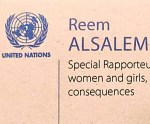 T
T